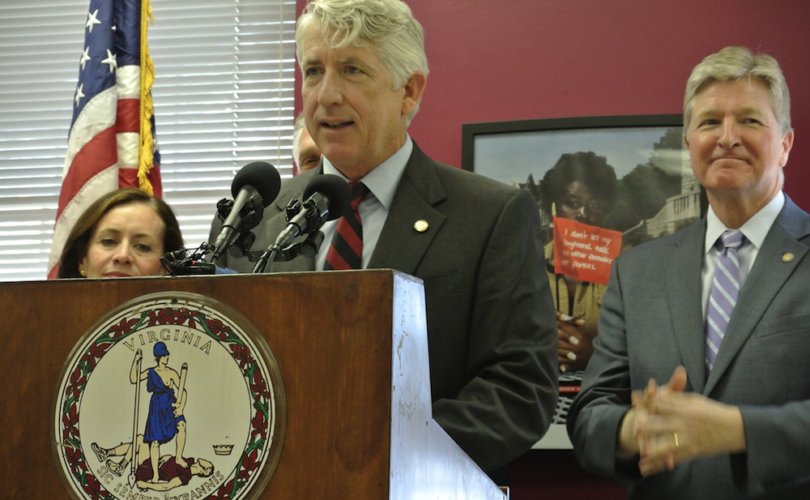RICHMOND, Virginia, October 25, 2018 (LifeSiteNews) — Virginia’s attorney general announced Wednesday that he is investigating clergy sexual abuse in the Catholic Church in the state, the latest in a lengthening list of investigations around the U.S.
Attorney General Mark Herring said the investigation was prompted by the Pennsylvania grand jury report released in August that found more than 300 priests had abused at least 1,000 children in six of the state’s eight dioceses over seven decades.
“Like so many Americans, I read the grand jury report on clergy abuse in the Catholic dioceses in Pennsylvania, and I felt sick,” Herring said. “It made me sick to see the extent of the damage done, the efforts to cover it up, and the complicity and enabling that went on by powerful people who should have known better and should have done more to protect vulnerable children.”
“We shouldn't assume the behavior and the problems are limited just to Pennsylvania or to one diocese,” Herring added. “If there has been abuse or cover-up in Virginia like there was in Pennsylvania I want to know about it, I want to root it out, and I want to help survivors get justice and get on a path to healing.”
Herring has also established a website and hotline for people to report sexual abuse associated with a place of worship or parochial/religious school.
The website provides information and connects directly to the Virginia State Police. The phone hotline will be open 24 hours a day and manned by State Police during regular business hours.
Herring’s announcement follows by one day another from Washington, D.C. Attorney General Karl Racine stating that he has launched an investigation into clergy sex abuse in the Archdiocese of Washington to determine whether the Archdiocese broke the law by covering up the abuse.
Racine said he was driven by the Pennsylvania grand jury’s findings, and has also set up a web portal for reporting clergy sex abuse to his office.
The scathing Pennsylvania report has led to numerous states launching investigations, including Illinois, Kentucky, Michigan, Missouri, Nebraska, New Jersey, New Mexico, and New York.
The U.S. Attorney for the District of Columbia, having jurisdiction over sex crimes in the District, has separately opened its own hotline for clergy sex abuse victims.
Herring’s announcement follows the federal subpoenas served October 18 to each of Pennsylvania’s eight dioceses in a statewide investigation there. The scope of that investigation remains unclear. The federal investigation originated in Pennsylvania, instead of Department of Justice (DOJ) in Washington, the Associated Press reported.
The Diocese of Buffalo, New York, also received a federal subpoena related to clerical sexual abuse in May, according CNN, from the DOJ.
U.S. Catholics continue to wait for the Church hierarchy to adequately acknowledge the clerical sex abuse scandal and take authentic action to address it.
Cardinal Donald Wuerl of Washington, D.C., under fire for protecting abusive priests while bishop of Pittsburgh and for his relationship to disgraced former Cardinal Theodore McCarrick, remains apostolic administrator of the Archdiocese of Washington until his successor is named and installed.
Pope Francis accepted Wuerl’s resignation earlier this month. Wuerl originally tendered it two-plus years ago upon reaching the retirement age for bishops of 75, but Francis did not accept it.
McCarrick, credibly accused of sexually abusing a teenager, has also been charged with abusing at least one other minor, along with sexually harassing or molesting countless seminarians and young priests. He stepped down from the College of Cardinals in late July, and has been sent to live in a Kansas friary, remaining a priest in good standing pending a Canonical trial into the allegations against him.
Since the clergy sex abuse scandal first broke in 2002, the media and many in the Church have framed the crisis as one of pedophilia – a psychiatric disorder in which an adult or older adolescent is attracted to prepubescent children, and can present whether an individual is heterosexual or same-sex attracted.
The Church’s own statistics, though, show that 81 percent of victims of sexual abuse by priests have been male and 78 percent of those were post-pubescent.
The Pennsylvania grand jury report statistics reflected prevalence of homosexual predation of teenagers as well.
The McCarrick allegations, which surfaced widely in June, have shined further light on the full extent of the Catholic Church abuse crisis — in particular the prevalence of homosexuality and predation of seminarians and other vulnerable adults – the awareness of which is still emerging. The specter of abusive bishops and cardinals is another element of the crisis brought to light by the McCarrick matter – the narrative previously centering only on priests.
The U.S. bishops have promised to investigate institutional abuse and cover-up to the extent that they can.
USCCB leaders traveled to Rome in September to request an Apostolic Visitation to investigate the circumstances that enabled McCarrick to prey upon young men for years while he rose to and remained in prominence in the Church.
The pope is the sole authority over bishops, and as such is the only one who can address their conduct or remove them.
Pope Francis apparently nixed the request and instead urged the U.S. bishops to go on retreat in lieu of holding their regular fall General Assembly next month – at which the bishops have committed to discuss the abuse crisis as a full body.
The USCCB Administrative Committee announced a four-point plan of action “within its authority” in late September to more comprehensively address the issue
Francis said earlier this month that he has ordered a “thorough study” of all Vatican documents regarding McCarrick.
The pope, however, has yet to answer allegations in testimonies from former U.S. Apostolic Nuncio Archbishop Carlo Maria Viganò that Francis and other high-level prelates knew about and covered for McCarrick.

